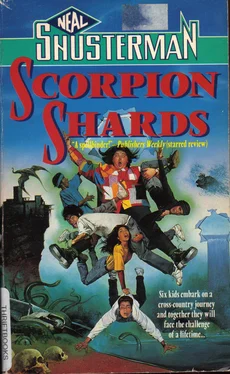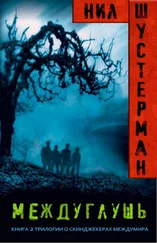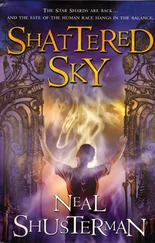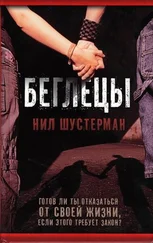At least one would board a plane.
At least ten of the people on that plane would board other planes, and in this way, the seed of destruction would be planted within the minds of thousands of travelers, moving in hundreds of different directions. In a matter of days, people around the world would suddenly be faced by the exact chain of events that would bring them to their breaking points and drive them mad. Millions of patterns collapsing like a house of cards.
In the end, the destruction of mankind would not come as a great nuclear holocaust. It would not come as a meteor splitting the earth in half. It would come from a simple thought whispered in one lonely man’s ear. A single thought, which would breed a rage of chaos that would sweep across the globe in a swift chain reaction.
Dillon remembered seeing a film once about a great steel bridge that had violently collapsed, brought down by mere resonance—the simple vibrations of the air around it. Dillon’s thought would surely resonate and bring down something far more mighty than a steel bridge. He was the hammer that would fracture every thought mankind had ever had, making civilization crumble to its very foundations.
Dillon pondered how a single thought—the right thought—had always had such power to create. Simple thoughts pushed in the right direction at the right time.
The idea of the wheel; the thought of the written word—simple ideas that had picked up momentum across the globe, swelled like a tidal wave and created civilization. How fitting that a single thought was all it took to bring it crashing down.
The power of such an act could only be surmounted by the power released when everything fell—power that would feed the wrecking-hunger like it had never before been fed. Just imagining it made Dillon drool, and he longed for the great process to begin.
For an instant the image of his dead parents flitted through his mind.
Are you proud of me now, Mom and Dad?
He didn’t wait for an answer. Instead he floored the accelerator, and the engine’s powerful roar drowned out the question before it could resonate in his mind.
PART V - BETWEEN THE WALLS
Slayton.
He didn’t need a first name.
Most of the time he didn’t need a name at all. He’d only drive his rusty pickup down into Cougar every few weeks or so for supplies, paying with ancient, crumpled bills, then he would disappear again down a dirt road that passed from life into death, from green trees into the dead valley in the shadow of the smoking mountain.
He was forty.
His skin was beginning to age, his hair beginning to gray—but inside, his thoughts and ideas, his very perception of the world had never grown beyond age eight or nine.
He was slow.
Not only in the way he thought, but in the way he moved. He had come to accept this as the way of things, and it only bothered him when he was among others, whose thoughts and actions were quicker. For that reason, he didn’t care much for people—being around people drained him—made him feel less of a man. So he steered clear of them and made himself the center of his own solitary universe, where things moved at his own speed.
He learned to care for himself at an early age.
He built a shack in the woods, and when the timber company that owned the land kicked him off, he moved, and built another. And then another. Now, he finally thought he had found a place where no one would bother him—a dead forest gray and bleak that no one wanted. Here they would finally leave him alone.
He drank too much.
A habit he had picked up from his father, years and years ago. When the wind would blow, and the alcohol would swim through his mind, he would swear there were ghosts in the trees, like in stories his Ma used to tell. Ghosts and demons were very real to Slayton. And so he was not entirely surprised when the Devil appeared at his door one bleak October evening.
The door creaked open to reveal him standing there. Slayton didn’t make a move. He just sat at his table, holding his half-full bottle of whiskey. The other half was already in his head. Slayton knew who it was without him having to say a word.
“You must be Slayton.”
“How do you know my name?”
“They told me about you in town.”
The Devil did not look quite the way Slayton expected. He was fat and young. A redheaded teenager with an awful complexion.
“I’ve been looking for you,” the Devil said.
“I’ll bet you have.”
Slayton invited the Devil in, watching him carefully as he moved. Darkness surrounded him like a black hole. Shadow flowed in his wake, rippling like a dark cape. A living fabric of death.
The Devil closed the door behind himself, and suddenly fear and anger began to overtake Slayton—but he bit it back, determined to stand toe to toe with the Devil. Slayton reached up, got a glass and poured some whiskey as the visitor sat down at the table. His darkness ebbed and flowed on the table like waves lapping the shore.
“Drink with me?” asked Slayton.
The Devil-boy shook his head, pushing the glass away.
“What’s the matter? Not old enough?” and Slayton let out a rough wheezing laugh at the thought of the Devil being underage. That was a good one!
“No time,” said his guest, looking into Slayton’s eyes, probing his very thoughts. “No time, I’m in a hurry.”
Only then did Slayton notice that this Devil-boy across the table was sweating something awful. He was breathing quickly, and shallowly as if he was out of breath—as if he was panicked, but trying to hide it.
“What’s yer angle?” asked Slayton.
“Angle?”
“If ya come to take me, how come y’aint done it? Go on—get it over with. I ain’t got no patience for the likes a you!”
The Devil-boy smiled a crooked, leprous smile. “You have no idea how very important you are,” he said. “I wouldn’t touch a hair on your head.”
“Then what are ya here fer?”
“Dinner,” said the Devil.
Slayton shook his head, and the world spun in circles one way and then the other. He took another swig of whiskey and left to see what there was to eat in the kitchen. What was the Devil likely to eat? he wondered. Beef jerky? Saltines? When he stumbled back out of the kitchen, he saw his visitor searching through his munitions locker, which had been locked.
“You get your nose outta there!” shouted Slayton, but the fat Devil boy didn’t move.
“You collect weapons?” asked the Devil-boy.
“What business is it of yours?”
The Devil-boy swung the door wide to reveal Slayton’s cache—a regular arsenal of all types of weaponry from rifle to pistol, from Bowie knife to crossbow. All shiny and clean.
“Most of ’em never been fired,” said Slayton. “All loaded, though. You never know when you might need one.”
“It’s a fine collection,” said the Devil-boy. Then he turned to the many items on Slayton’s shelves. Old family pictures. Knickknacks from here and there. He brushed his finger across the dusty shelf, and his eyes darted back and forth, looking at everything—first everything on the shelf, then everything in the room. His eyes moved so quickly, Slayton couldn’t keep up with him. Those awful blue-green eyes—they were invading him, weren’t they? They were violating all of his personal things. Slayton could not stand for this, so he grabbed one of the many weapons stacked in his closet—a rifle—and aimed it at the Devil.
“I don’t got no dinner for you,” Slayton said. “You’d better go now.”
The Devil-boy ignored Slayton. Instead, he tilted his head slightly, as if listening . . . then he sniffed the air . . . and then it was as if something snapped into place. He turned his eyes to Slayton once more and fixed his gaze.
Читать дальше












![Нил Шустерман - Жнец [litres]](/books/418707/nil-shusterman-zhnec-litres-thumb.webp)